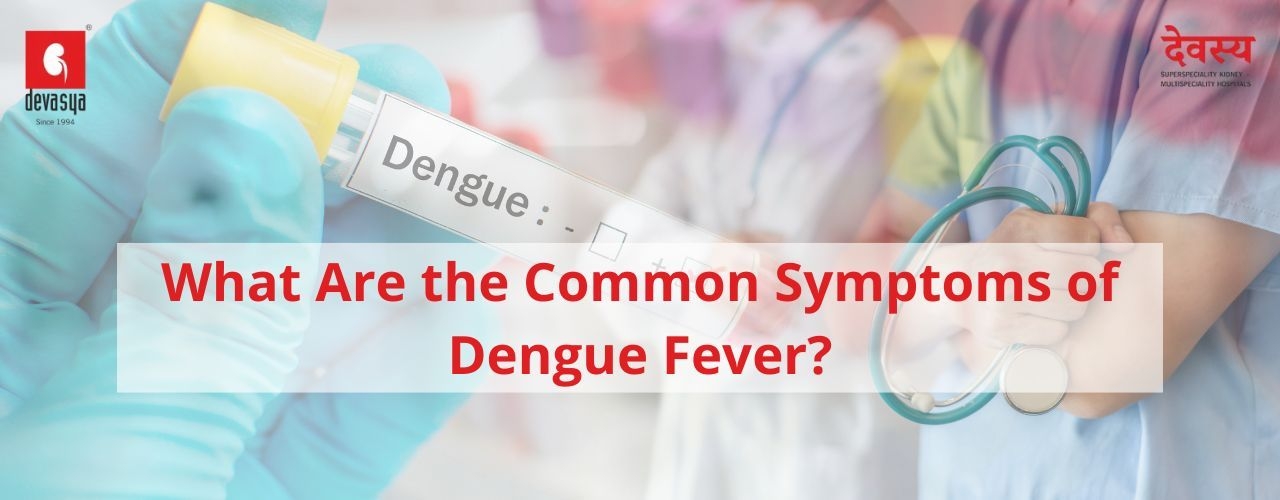What Are the Common Symptoms of Dengue Fever?
Dr. Dinesh Patel
Dengue fever is on the rise in India, and recognizing its symptoms can save lives. From early signs, such as fever and rashes, to severe warning signals, this blog explains it all in simple terms. Learn about causes, diagnosis, treatment, and prevention of dengue. Keep yourself updated and choose the right hospital when timely care matters the most.

The sound of rain brings a welcome relief from the summer heat. But with the monsoon season comes a health challenge we all need to be aware of: dengue fever. While the thought of it can be worrying, staying safe is simply a matter of knowing the facts and being prepared. With every monsoon, dengue fever turns into a major health concern across India. In 2024, more than 233,000 people got dengue, and 297 people died from it. The numbers might worry you, but remember, dengue can be stopped before it spreads and treated safely if found in time.
To stay healthy and worry-free, you need simple and reliable advice. This blog shares easy-to-understand facts about dengue - from its symptoms to simple ways you can protect yourself and your family.
But how can you know if it is dengue or just a regular viral fever? What symptoms should you never ignore? And when should you rush to an emergency hospital in Ahmedabad? Let us explore step by step in simple words.
What Is Dengue Fever and How Does It Spread?
Dengue is a viral fever, and the culprit is a tiny mosquito called Aedes. They mostly bite in the daytime and multiply in stagnant water found in buckets, plant pots, or uncovered containers.
Here is what makes dengue different from regular fever:
- It is not contagious between people. Dengue does not spread directly from one person to another, except in rare cases when a pregnant woman passes it to her baby.
- Dengue spreads only through infected female Aedes mosquitoes. Regular mosquito bites do not cause it.
- Dengue cases rise mostly during and after the rains, as stagnant water becomes breeding spots for mosquitoes.
What Causes Dengue Fever?
Dengue fever happens when a special type of mosquito bites you. This mosquito carries a virus inside it. There are four different types of this dengue virus.
When the mosquito bites you, the virus goes into your blood and starts making copies of itself. You get sick because your body tries to fight the virus, but sometimes this fight causes problems.
The virus can hurt the parts of your blood that help stop bleeding. It also weakens your small blood vessels. When your body fights back, it releases chemicals that can make blood leak out of these weak vessels. This is why serious dengue can be dangerous - it can cause bleeding inside your body and hurt your organs.
Common Dengue Symptoms by Stage
Dengue symptoms can differ from person to person, but they usually follow a set pattern. It is vital to know the early signs and the serious warning signs that need quick medical care.
Early Dengue Symptoms (Days 1–3)
These symptoms typically appear about 4 to 7 days after a mosquito bite. They can often be confused with a regular viral fever.
- Sudden High Fever: An abrupt and high fever.
- Severe Headaches: A strong headache, especially behind the eyes.
- Nausea & Vomiting: Many people feel sick to their stomach and may vomit.
- Muscle and Joint Pain: It is often called “breakbone fever” due to the intense muscle, joint, and bone pain it brings.
- Fatigue: You may feel extremely tired and drained of energy.
- Mild Skin Rash: A red, spotty rash can sometimes appear on the body.
Severe Dengue Symptoms That Need Urgent Care
For some people, dengue can turn serious after the initial fever subsides. These warning signs signal the need for urgent hospital care without delay.
- Severe Abdominal Pain
- Persistent Vomiting (three or more times in 24 hours)
- Bleeding from the gums, nose, or skin (bruising)
- Blood in vomit or stool
- Rapid, shallow breathing
- Extreme Fatigue or Restlessness
- Cold, Clammy Skin
- Difficulty Breathing
If you or a loved one shows any of these warning signs, do not wait; visit an emergency and trauma care hospital in Ahmedabad right away.
Dengue Diagnosis: When and What Tests to Get
How do doctors confirm dengue?
If your fever lasts more than 2 to 3 days or you notice symptoms like body aches, rashes, or severe weakness, doctors usually advise blood tests to check for dengue.
Which tests are done for dengue?
-
NS1 Antigen Test: This test can find the virus during the first 5 days of illness.
-
IgM/IgG Antibody Test: This shows whether your body is currently fighting dengue or has previously fought the infection.
-
Complete Blood Count (CBC): This test checks your platelet count and overall blood condition.
Do you always need a test?
Yes. Dengue symptoms can look very similar to viral fever, chikungunya, or even the flu. A simple test removes confusion and ensures the right treatment on time.
Where should you get tested?
Always choose a trusted diagnostic centre or hospital. If your symptoms are severe, such as bleeding, ongoing vomiting, or extreme weakness, visit an emergency hospital in Ahmedabad like Devasya Hospital for quick testing and immediate care.
When to Visit the Emergency Room?
If you notice any serious warning signs of dengue, even if your fever or other symptoms seem to have improved, do not wait. Go to the nearest ER right away, as severe dengue can worsen suddenly and become dangerous.
Dengue Treatment Options: Home Care vs. Hospital Care
There is no exact medicine that cures dengue. Treatment mainly focuses on easing the symptoms and preventing serious problems.
Home Care (for Mild Cases):
-
Rest: Get plenty of rest to help your body recover.
-
Fever & Pain Management: Take paracetamol (acetaminophen) to reduce fever and relieve pain. Avoid medicines like aspirin or ibuprofen, as they may trigger severe internal bleeding in dengue patients.
-
Hydration: Drink lots of fluids like water, coconut water, or ORS to prevent dehydration, which is the biggest risk.
Hospital Care (for Severe Cases):
If a patient develops severe dengue symptoms, they must be admitted to a hospital for close monitoring. Hospital care includes:
-
Intravenous (IV) Fluids: To prevent dehydration, which can be life-threatening.
-
Blood Transfusions: If there is severe bleeding.
-
Continuous Monitoring: To keep a close watch on vital signs, fluid levels, and platelet counts.
How to Prevent Dengue Fever: 5 Simple and Effective Steps
Prevention is the strongest protection against dengue. With no widely available vaccine in India, the key is stopping mosquitoes from breeding.
-
Remove Breeding Places: The Aedes mosquito lays eggs in clean, still water. Check and empty any water that collects in your coolers, flower pots, trays, and old containers regularly.
-
Use Mosquito Repellents: Apply mosquito repellent on open skin, particularly in the daytime when bites are more common.
-
Use Mosquito Nets: Sleep under a mosquito net, especially if you live in a high-risk area.
-
Wear Protective Clothing: Cover up with long sleeves, pants, and socks when outside to reduce mosquito exposure.
-
Install Screens: Fit your windows and doors with screens to block mosquitoes from entering indoors.
Final Word: Be Alert, Act Fast, Trust the Right Care
Dengue can go from bad to worse quickly, but finding it early and getting help quickly can save lives. Look for warning signs, do not ignore bad symptoms, and get a blood test right away. Looking for the top 10 multispeciality hospitals in Ahmedabad? Choose a hospital that provides trusted treatment along with 24/7 emergency support.
At Devasya Hospital, Ahmedabad, our 24/7 emergency and trauma care team, quick testing, and experienced doctors are here to keep you and your family safe.
Note: This blog is for awareness purposes only and not a substitute for medical advice. If you or your loved ones show dengue symptoms, seek a doctor right away.
FAQs on Dengue Fever
How do I know if dengue is getting serious?
Warning signs of severe dengue include constant vomiting, bleeding gums or nose, stomach pain, difficulty breathing, or extreme tiredness. These need urgent medical care.
Which hospital is best for dengue treatment in Ahmedabad?
Select a hospital that has round-the-clock emergency care, quick lab results, and expert doctors. Devasya Hospital is among the trusted choices for dengue and other emergencies in Ahmedabad.
Is dengue contagious from person to person?
No, dengue cannot be caught directly from another person. Only mosquitoes spread the virus.
What is the difference between dengue and chikungunya?
These are both illnesses spread by mosquitoes, and they look very similar, but chikungunya makes your joints hurt much more, and the pain can last for many months. Only medical tests can tell which one you have, as each needs different care.
Can You Get Dengue More Than Once?
Yes, you can. Dengue has four different types of viruses, so a person can catch it up to four times. The second time is often worse than the first, which is why preventing mosquito bites is very important even if you have already had dengue before.
Is it safe to take a painkiller like Ibuprofen or Aspirin for dengue fever?
No, it is not safe. Stay away from Ibuprofen and Aspirin, as they increase the chances of bleeding, a dangerous complication of dengue. For fever and pain, only take Paracetamol (acetaminophen), and use it only as advised by your doctor.


